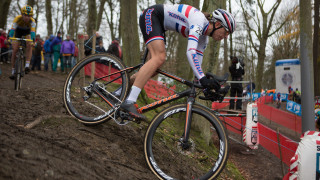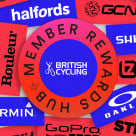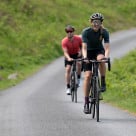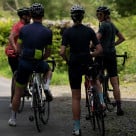Less than a week before travelling to the Czech Republic for the UCI Cyclo-cross World Championships in Tabor, nine-time British champion Helen Wyman took time out to answer your Twitter questions.
#askwyman Training to win: fun part of the job or necessary suffering as means to an end?
— James Davenport (@one_cog_mind) January 23, 2015
HW: Definitely a necessary evil!
I love riding and racing my ‘cross bike but road training not so much. When I am riding well and at the peak points of my season it does feel good to go out and smash a peak power record or feel better riding the same intervals than I did the week before.
However coming back from the off-season is the worst time ever. I have ended the last few seasons with a couple of wins, so the last time I rode my bike I felt great.
I then take three weeks off and the first hour of the first ride back I am a hero, the next hour I feel like I’ve never ridden a bike before!!!
Unfortunately in life you don’t get very far without hard work and for ‘cross that means a lot of high heart rate intervals and general pain from May through to February every year!
@CXHelen @BritishCycling #askwyman How do I convince my wife how awesome cycling is and that she should take it up? #triedandfailed
— Lewis (@jollygoodvelo) January 20, 2015
HW: This is a really good question.
I would suggest first step is to get her the nicest bike you can. If she wants a full-on drop bar bike get it.
If she wants a girl’s shopping bike get the lightest one with the nicest gear ratios. When she’s confident she would be much happier riding.
Then maybe see if there is a Breeze ride in your local area where she can try riding in a safer environment with people who are newbies, where she doesn’t feel inferior or like she’s slowing anyone down.
Then if she likes this you can gradually get her doing more rides with you. If this fails, trade her a bike ride for something she wants to do with you that you really don’t want to ha ha ha!
@CXHelen are there any mechanical TOP TIPS for trying CX on the cheap?
— Josh Owen Morris (@JoshOwenMorris) January 20, 2015
HW: A CX bike is great all rounder. If I was a cycling fan, with a burning desire to give racing a try at some point, I’d buy a CX bike. That one bike can be used on the road, in CX, and to commute. All you need are few sets of tyres.
It’s a fun sport, out of the traffic, with a wonderfully supportive community at local level. Once you try it, you’ll be hooked.
#askwyman What types of athlete support do you use and feel is most useful to you..massage, chiro, physio etc?
— North End Chiro (@NorthEndChiro) January 20, 2015
HW: I have a great team around me which I really rely on the whole year round. It’s taken me time to find the right people but they are all really important. My husband is my day-to-day coach, driver, mechanic, PR man and general emotional supporter. Then we work together with a sports scientist who does my training overview and lab testing. On race day I have a second mechanic and a jersey man, really important roles to make a smooth day.
In terms of health I have some fantastic people in Oudenaarde (Belgium) where I am based for the winter. I have a masseur, chiropractor, acupuncturist, sports doctor and physiotherapist. They all play really important roles.
I am a qualified physiotherapist myself so I am pretty good at determining my own injuries and seeking the right treatment at the right time from the right person.
Having said that I have massage every week as I really believe in its preventative help. To me having the right people to use for the right injuries is the most important thing and living in Belgium, life is definitely easy as they all know exactly what happens in my sport.
@CXHelen Why not use flat bars on the cyclocross bike? Better braking, gear change+handling. (is it tradition?) #askwyman
— Paul Chappells (@papsmitt) January 19, 2015
HW: I have absolutely no idea but way back in 1999/2000 the rules were put in place that you had to race UCI races on a cross bike with drop handlebars. I guess it’s a major part of what defines our sport. The only thing that has changed over the years is the restriction on tyre widths which currently stands at a maximum of 33mm.
#askwyman How much running, if any, do you do in training?
— Tony Whetham (@TonyWhetham) January 19, 2015
HW: Not too much to be honest. Cross is a very varied sport, with lots of aspects. Running makes up a very tiny percentage of most races. Even long running sections are only 100 metres. So I’m not going to focus on doing 10 kilometres in training. But in cross training I run with my bike and do a lot of work on dismounts and remounts.
When I do run, it’s on soft ground. I don’t want to encourage injury, so I stick to soft running tracks and grass.
@CXHelen What's the future in CX for talented young girls like Amira Mellor and Sophie Thackray you think? #askwyman
— Thomas Sneyers (@ThomasSneyers) January 19, 2015
HW: There are several really good young riders coming through in the UK. I hope the future is good for them. I’m here to help them if they want my help. I’m set up in Belgium, well connected and have many years of learning from mistakes to help take away some of the hurdles that lay in front of them.
But they have to choose if they want to do it. It’s a big commitment. Belgium is really different to the UK and these are young riders. At the moment to really reach the top, you’ve got to be here a lot (unless you are a super talent like Prevot or Lechner). But as I say, I think it’s a great sport and I hope they want to do it.
The changes coming in for women from the UCI commission will provide them with a good future; a youth women’s category, more prize money and more events. So if I was them, I’d be packing my bags my right now, destination Belgium.
@CXHelen what would you like to see @BritishCycling do to develop cyclocross in the UK #AskWyman
— David Watts (@crossboy) January 19, 2015
HW: I think largely BC’s role in that is pretty small. They register races, but at the UCI the regulations are set. Next year all C2 races need to have a men and women’s race. There is a set running order for races. Minimum prize money is being equalised gradually. BC can’t change these things come the biggest races.
The smaller races are more about the desire of the organisers. I normally get shot down when I mention comparisons to CX in the USA, but I think the UK needs to look a lot more at the USA for examples than it does Belgium or Holland.
In Belgium and Holland we have an elite-driven sport. Gate entry fees to get into races, start contracts to riders, live television coverage. The list goes on.
In the UK (and USA) we have a participation-driven sport. No gate entry fees, little TV, and few start contracts. I remember one race where in the UK they charged £1 to get in… people refused to pay and parked outside. You wouldn’t see that in the Belgium.
A good example of one area we could learn from the USA is using double days of racing. Every major event in the USA runs on Saturday and Sunday. They reverse the course, and it provides a totally different challenge. The organiser only has one course to set up but they get two lots of entry fees. That’s what covers events. If I’m going to travel a long way for a race, especially when it’s on a cool course, I’d much rather have two bites of the cherry.
We have a long way to go in the UK. We had 10,000 people at the Milton Keynes world cup, but around 200 non-racing spectators at Nationals. When we fix things like that, the sport can really move forward.
@BritishCycling @CXHelen #askwyman do you think BC should help develop CX coaching with a Level 3 qualification?
— Rich Edge (@vdubber67) January 19, 2015
HW: I’m not even a level 2 coach, so that’s hard to answer. But by level 3 you are looking at elite of the elite I guess. A lot of cross is fitness, lots is technique. But I guess the best coaches in cross need experience or exposure to top level racing. And that exposure needs to be current. Cross is developing and moving on every year.
I’ve certainly seen cases where riders are getting towards dominant in the UK or other countries but can’t make the jump to major European events. So having the right people to identify the very specific differences would be really important. I’d sign up to the course if they did!





